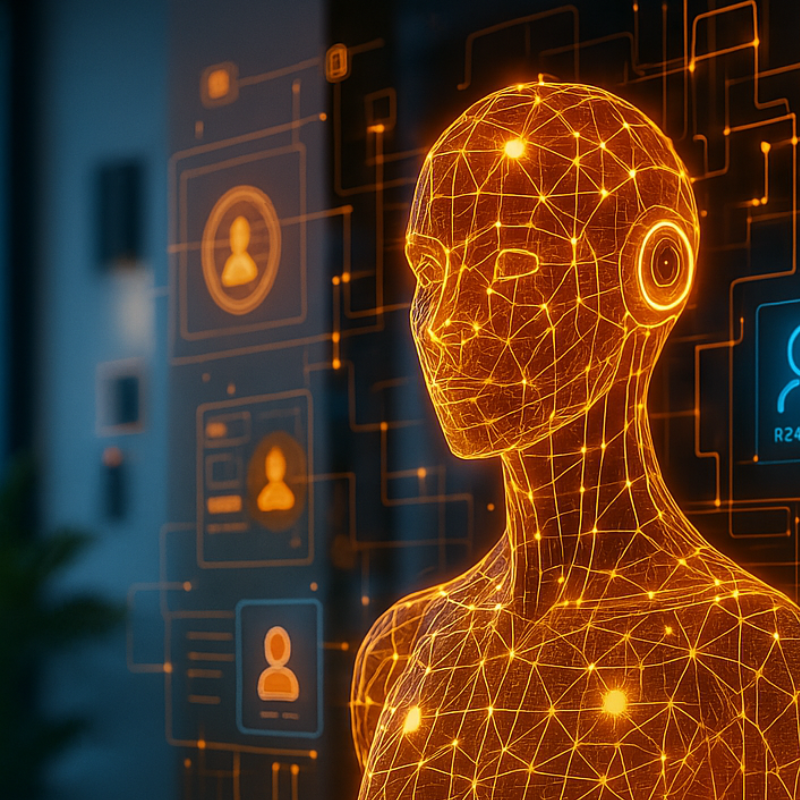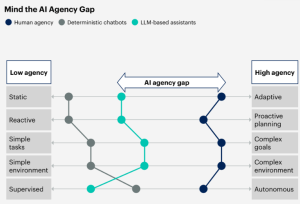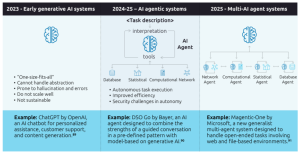AI Agents

Key Takeaway:
AI agents are evolving from reactive tools to autonomous collaborators capable of executing complex tasks, coordinating with other agents, and learning over time. With growing enterprise adoption, they’re poised to transform workflows, personalize services, and boost productivity across industries. Deloitte predicts 25% of GenAI-using companies will launch AI agent pilots in 2025. As multi-agent systems mature and agent commerce emerges, businesses must navigate ethical, regulatory, and technical challenges. Success will depend on human oversight, trusted ecosystems, and responsible deployment—ushering in a new era of intelligent, proactive digital collaborators.
Trend Type: Social & Business
Sub-trends: AI Agents, From Copilots to AI Agents, AI Agents Get Money to Spend, Agentic AI Delivers Personalization
The Emergence of Agentic AI: From Tools to Autonomous Decision-Makers
AI agents—software systems capable of independently completing complex tasks—are becoming one of the most closely watched innovations in the GenAI space. Unlike traditional chatbots or co-pilots, these systems have true agency: they can make decisions, execute tasks, use tools, and even collaborate with other agents, all with minimal human oversight. According to a Capgemini Research Institute global survey of 1,500 executives, 32% rank AI agents as the leading trend in data and AI by 2025. Deloitte predicts that 25% of companies using GenAI will launch agentic AI pilots this year, growing to 50% by 2027.
Agentic AI enables systems to access multimodal information, process it contextually, and act proactively. As Gartner explains, these systems integrate memory, planning, sensing, and safety protocols, allowing them to carry out assigned objectives autonomously. By 2028, 15% of day-to-day work decisions will be made by agentic AI, up from 0% in 2024.
This shift is already underway. 26% of respondents in Deloitte’s survey said their organizations are exploring autonomous agent development to a large or very large extent. Yet, as with GenAI more broadly, agentic AI is not a silver bullet. The same challenges persist—regulatory ambiguity, risk management, data quality, and talent shortages—and are intensified by the systems’ increased complexity. Lourdes Rodriguez, a foresight consultant at the European Commission, warns that expectations may be overblown, with transparency and traceability still needing to catch up before scale becomes viable.
Still, the momentum is growing. A high-tech executive cited in Deloitte’s research stated that specialized agents for tasks like sales research will help teams manage data overload and improve efficiency, with single-agent pilots leading the way before multi-agent systems scale.

Source: Deloitte Insights 2024
Multi-Agent Systems and the Rise of Complex AI Workflows
While most agentic AI initiatives today begin with single-agent implementations, the future lies in multi-agent systems—networks of AI agents that collaborate to accomplish more sophisticated goals. The Future Today Institute describes this as a shift from reactive tools to autonomous systems that can set objectives, identify opportunities, and execute complex strategies.
These multi-agent collaborations are already being tested. Thoughtworks highlights the rise of frameworks like Autogen and CrewAI, which allow developers to assign specific roles to agents, enabling them to break down complex tasks, interact, and coordinate dynamically. However, this area is still early in its maturity. Experimental systems have encountered challenges such as agents looping endlessly or acting unpredictably. Frameworks like LangGraph are emerging to give developers more control by defining agent flows in graph-like structures, and organizations are urged to implement fail-safes and human oversight.

Source: Capgemini Top Tech Trends
Commercialization, Investment, and Business Integration
Agentic AI is not only a technological leap—it’s also attracting massive investment and fueling commercial transformation. In the past two years alone, over $2 billion has been invested in agentic AI startups, primarily targeting the enterprise market. Many tech giants and cloud providers are also developing their own offerings, licensing tech from startups, and hiring agentic AI talent rather than acquiring companies outright (Deloitte TMT).
PWC suggests that AI agents will double the capacity of knowledge workers, particularly in roles such as sales, field support, and product development. These agents can handle routine inquiries, write code drafts, turn ideas into prototypes, and fundamentally transform how work gets done. However, people will remain central—guiding, iterating with, and orchestrating teams of AI agents.
One critical area of innovation is AI agent commerce. Today’s payments infrastructure is designed to exclude bots, limiting agent utility. However, new tools are emerging. Stripe recently launched a developer tool that enables trusted AI agents to securely spend funds, marking a shift from payments infrastructure designed to block bots to one that supports agent-driven commerce. All this while crypto is emerging as the first native payment rail for autonomous agents. A trusted framework for agent commerce—an “agent trust layer”—is likely to be one of the first big market opportunities in this space.
Personalization is another key benefit. Agentic AI doesn’t rely on predefined rules or static datasets—it learns continuously, integrating real-time context like user history, behavior, preferences, and network data. For example, a customer support agent could anticipate issues before a user reaches out, or a network management agent could autonomously detect and resolve outages.
As AI agents become more autonomous, the need for governance and guardrails intensifies. Many organizations are expected to implement mandatory ethical guidelines in 2025 to ensure fairness, transparency, and protection of intellectual property as AI agents move from isolated tools to full collaborators in core business processes.
In sum, AI agents promise to unlock new efficiencies, streamline workflows, and enable personalized, autonomous service across industries. As businesses invest in this next frontier, success will depend not just on the technology itself, but on the ecosystems, ethics, and partnerships that support it.
Use Cases
AI Agents: Skyfire is building a payments network that enables AI agents to make autonomous transactions. Skyfire created a payment network specifically for AI agents to make autonomous transactions. Now, obviously, AI agents are hard to control today, so the idea of one tied to your bank account is terrifying. However, Skyfire uses a number of safeguards to prevent AI agents from overspending, making the whole thing a little less scary. It assigns each AI agent a digital wallet with a unique identifier, where businesses can deposit a set amount of funds they want the agent to spend, so they don’t get unlimited access to a bank account. Skyfire also allows customers to set limits on how much an AI
From Copilots to AI Agents: In this video, IBM’s Maya Murad explores the evolution of AI agents and their pivotal role in revolutionizing AI systems. From monolithic models to compound AI systems, discover how AI agents integrate with databases and external tools to enhance problem-solving capabilities and adaptability.
Use Cases
Sub-Trend Sources
AI Agents: Delloite Generative AI Report, Delloite TMT Predictions, eMarketer Tech Trends and Predictions, Forrester Predictions: B2C Marketing & CX, Gartner: Top10 Strategic Tech Trends, PWC AI Business Predictions, Thoughtworks Tech Radar, Future Today Institute
From Copilots to AI Agents: Capgemini Top Tech Trends
AI Agents Get Money to Spend: CB Insights Tech Trends
Agentic AI Delivers Personalization: Cisco Trends
What to Read Next
Embodied AI
Embodied AI and Robotics The integration of foundation models into robotics is revolutionizing how machines interact with the world, enabling them to reason, adapt, and operate autonomously in dynamic environments.[...]
Ambivalent Reality
The Erosion of Digital Trust As generative AI becomes more embedded in everyday life, trust in digital spaces is eroding. The ease with which content can be generated and manipulated[...]
Energy Challenge
The Collision of AI and Energy Demand The rise of generative AI is not only transforming digital landscapes—it’s also reshaping the global energy equation. According to Deloitte, the rapid expansion[...]
What to Read Next
Embodied AI
Embodied AI and Robotics The integration of foundation models into robotics is revolutionizing how machines interact with the world, enabling them to reason, adapt, and[...]
Ambivalent Reality
The Erosion of Digital Trust As generative AI becomes more embedded in everyday life, trust in digital spaces is eroding. The ease with which content[...]
Energy Challenge
The Collision of AI and Energy Demand The rise of generative AI is not only transforming digital landscapes—it’s also reshaping the global energy equation. According[...]


